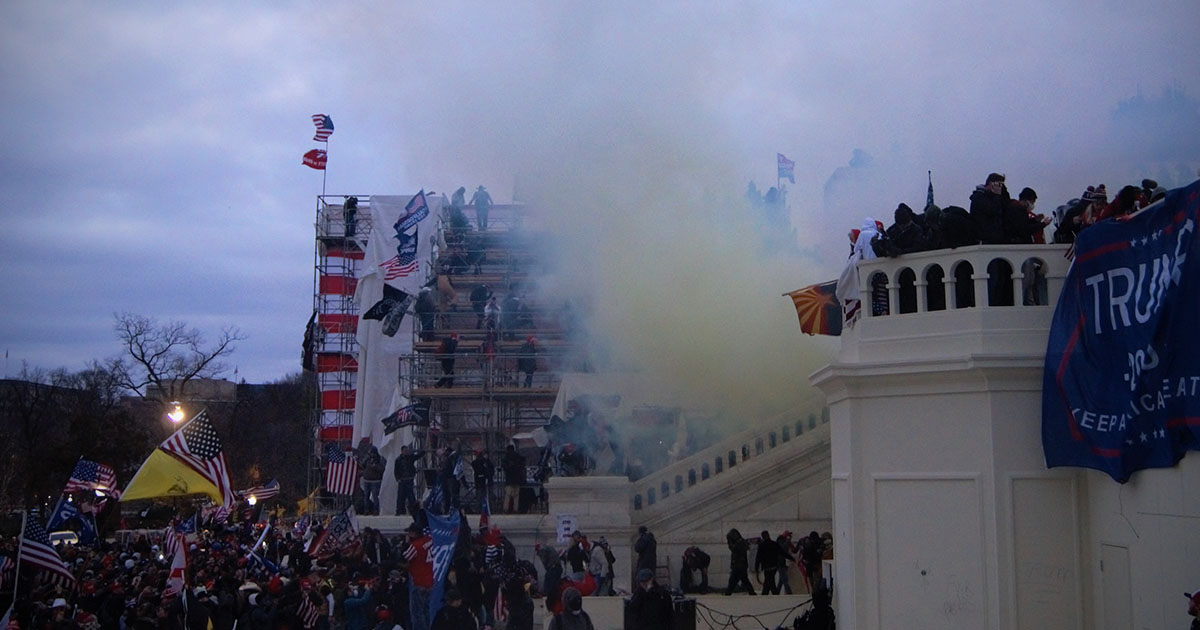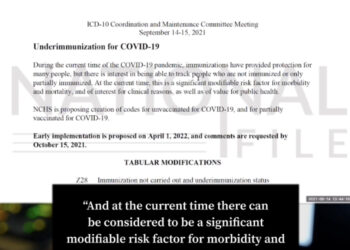Last Updated on December 11, 2021
Federal prosecutors claim that the unindicted co-conspirator known as Person 10 of the Oath Keepers was not credible in his interview with the FBI, in which he told an agent more than six times that there was no plan or conspiracy to enter the U.S. Capitol on January 6, 2021. At the same time, prosecutors have used Person 10’s statements and messages to build federal cases against other Oath Keepers.
Prosecutors also claimed for the first time that Person One, long believed to be Oath Keepers leader Stewart Rhodes, made statements that corroborated Person 10’s story during his interview with the FBI.
Earlier this week, National File reported a bombshell inconsistency in the narrative concocted by federal prosecutors regarding January 6.
According to FBI interview notes with the Oath Keeper identified as Person 10, one of the individuals mentioned extensively by Revolver News in a story that stressed the possibility of federal involvement in the civil unrest that occurred that day, Person 10 repeatedly told an FBI agent that there was no Oath Keepers plan to enter the U.S. Capitol in a May 4, 2021 interview with the federal agency.
This directly contradicts the government’s claims that there was a planned conspiracy to enter the U.S. Capitol, and revealed that previous text messages sent by Person 10, made public via legal filings, were taken out of context.
When defense attorney Brad Geyer, who represents January 6 defendant and Oath Keeper Kenneth Harrelson, moved to have his client released on bail after the Person 10 revelation, prosecutors argued that Harrelson should continue to be held without bail because the information relayed by Person 10 was already revealed by Person One, and regardless, Person 10 should not be considered credible in his interview with the FBI.
Person One has been identified by multiple sources, including Revolver News, as Oath Keepers leader Stewart Rhodes. Person 10 has not been publicly identified, but it is acknowledged that he is an Oath Keeper who was placed in charge of planning for the group’s activities for January 6 by Rhodes.
According to the federal prosecutors in their response to Geyer’s motion for Harrelson to be released pending trial, “Person Ten’s statements about lack of pre-planning (a) do not constitute ‘new’ information, because they are cumulative of other previously disclosed statements made by other Oath Keeper leaders, (b) lack credibility, and (c) even if taken as true, elevate Kelly Meggs and Kenneth Harrelson to a higher position of leadership and responsibility within this conspiracy.”
Neither Person One nor Person 10 have been charged with any crimes. The government is asserting that statements of two unindicted co-conspirators that were made to the FBI, which seem to directly contradict the charges pending against several Oath Keepers, are not credible.
Despite claiming that Person 10’s interview with the FBI should not be considered credible, the prosecutors themselves are relying on communications and statements from Rhodes and Person 10 to build the case that Oath Keepers members were engaged in a conspiracy to obstruct Congress on January 6.
Many of the statements from Rhodes and Person 10 used by the prosecutors to do make this case, however, are not in the form of an FBI interview.
Instead, the prosecutors apparently believe Person 10 should be considered credible in the informal texts and messages he sent to various group chats on January 6 and the days immediately before it, but not while speaking to the FBI.
In his interview with the FBI, Person 10 clarified several statements he made in those messages during that FBI interview, including that a Quick Reaction Force (QRF) meant security personnel able to evacuate high profile Republicans and other protectees in the context of the Oath Keepers’ organizational structure.
Because the prosecutors say Person 10 is not credible in this interview, it would appear that the prosecutors believe only their interpretation of those messages should count in court. Person 10 is apparently not entitled to give his opinion regarding what he said.
It also seems as though the prosecutors are suggesting that Person 10, despite not being charged with any crimes related to January 6, may in fact be guilty of lying to the FBI about the events that happened that day.
January 6 defense attorney Jon Moseley, who represents Oath Keeper Kelly Meggs, reminded National File that this is not only a crime, but one that has been prosecuted recently.
“If they don’t believe what he said, well, lying to an FBI agent is what they accused Michael Flynn of doing,” said Moseley. “Why is he unindicted?”
In their response to Geyer’s attempt to secure bail for Harrelson, the federal prosecutors also acknowledge that Person 10 was subordinate to Person One. This supports the leadership structure reported by National File, in which Rhodes delegated planning for the organization’s activities on January 6 to Person 10.
This admission, despite the prosecutors’ insistence, would also seem to add to Person 10’s credibility. Person 10 was described by an FBI agent in his interview notes as the person who was ultimately responsible for the operations of the Oath Keepers in Washington, D.C. on that day. Person 10 asserted this in the interview, and it was not challenged by the FBI agent.
To make matters worse for the prosecutors, Moseley recently told National File that multiple witnesses may have corroborated Person 10’s story in their respective interviews with the FBI.
The fact that the government has admitted Person One, Stewart Rhodes, corroborated Person 10’s statements would seem to serve as evidence of Moseley’s claim, and today Moseley told National File that he now believes at least three more witnesses did the same in their respective interviews.
Should multiple witnesses have contradicted the prosecutors’ claims while speaking to the FBI, and should prosecutors have failed to inform the grand jury, Moseley believes this could ultimately be grounds for the case to be dismissed for prosecutorial misconduct.















